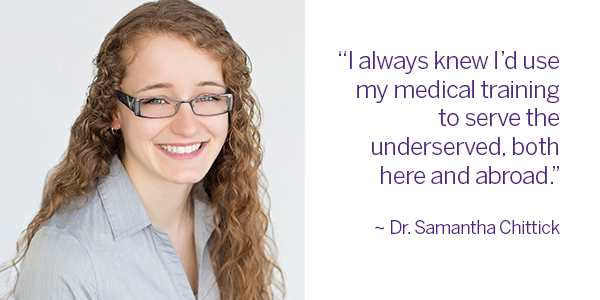Community News

- What program you a resident are of and what year of residency are you in?
I am a PGY1 in the Rural Hanover Program.
- Where were you born and raised, and what degree(s) do you have, and from what university (ies)?
I was born and raised in the sun-shiny Okanagan Valley, in British Columbia. I received by BSc in Anatomy and Cell Biology from McGill University, and my MD from the University of British Columbia.
- Why did you choose to pursue your residency at Schulich Medicine & Dentistry?
I chose Rural Family Medicine at Western University because of the strong rural full-service training program in Hanover, with fantastic preceptors and an entire medical community fully committed to training well-equipped comprehensive rural family docs. I also knew that Western’s flexible program would help me tailor my residency to become the family doctor I wanted to be.
- What unique experience are you undertaking this year?
I will be taking an eight month unpaid educational leave of absence from July 2016 – Feb 2017. Two months of this will be doing course work and in-person training (>450 hours) through the University of Minnesota (UMN) in tropical medicine, refugee health, and travel medicine, and six months will be spent in Niger doing tropical medicine humanitarian work. This will allow me, in the fall of 2018 after I have completed my residency training, to sit the American Society of Tropical Medicine and Hygiene’s (ASTMH) Certificate in Clinical Tropical Medicine and Travelers’ Health (CTropMed) exam to obtain the highly regarded CTropMed certification.
- Tell us more about Niger and what you will be doing there
Niger is an extremely poor, landlocked West African country with an incredibly high health burden. The population is over 19 million, >50% of which is under the age of 15. It has the world’s highest birth rate (>7.5 children/mother) and the 4th highest infant mortality rate. Over 10 per cent of children die before their fifth birthday. It is endemic for diseases like malaria, HIV, and TB, and most of the country has minimal access to health care.
Galmi Hospital is a 150-bed hospital in a remote area on the edge of the Saharan desert (think >40 degrees + humidity). It was established over 60 years ago by an NGO called SIM, is staffed by doctors from all over the world, employs a couple hundred locals, and has an African surgical residency program. There are Medicine, OB, Peds, and surgery wards, busy nutrition and HIV/AIDS education and treatment programs, and they see over 300 outpatients daily. I’ve been told that people walk for days to be seen and you could work 24 hours a day and still not reach the end of the line.
- What prompted you to pursue global health training?
Global health is a passion of mine; it’s actually why I went into medicine in the first place. We in the wealthy western world, and here at Western, have been blessed with access to fantastic medical training. Canada has huge health care needs, especially rurally, which is part of why I chose a rural training program. But we cannot neglect the needs of our global neighbours, both in Canada and abroad. To quote some famous words, “With great power, comes great responsibility.” For me, I always knew I’d use my medical training to serve the underserved, both here and abroad. When I discovered the ASTMH CTropMed certification, and UMN’s fantastic global health program, I was ecstatic. It provides me a wealth of knowledge and skills, that allow me to actually be of use in low-resource poverty-stricken places like Niger, and it also allows me to better serve our Canadian population here at home.
- How do you think it will impact your training and practice after your return?
Global health will always be in my blood and I will definitely be doing further overseas trips throughout my career. This training, certification, and trip will better prepare me for those. But it will also give me invaluable skills to serve our “local” global population, from immigrants, to traveling Canadians, to our huge influx of refugees. Canada needs physicians trained in tropical medicine, refugee health, and travel medicine. I am incredibly excited for this training and experience this year and to see where it will lead me in the future.








